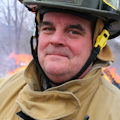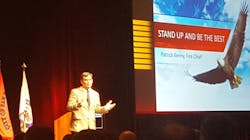FHWorld17: Keynote Speaker Challenges FFs to Stand Up for Cancer, Mental Illness
SAN DIEGO – People with mental health issues are suffering from a serious illnesses with consequences that are as serious and real as terminal cancer.
Firehouse World 17 keynote speaker Patrick Kenny, chief of the Western Springs, IL, Fire Department, shared a very moving a personal story about how both illnesses affected his life and his family.
In his address titled “Are You Willing to Stand Up and be the Best,” Kenny said he lost his wife, Eileen, to brain cancer and his son, Sean, to terminal mental health issues. That, he said, gave him reason to speak about the topics with a personal passion that brought tears to many in the packed convention center hall.
“I am up here because of Sean, talking about mental health,” Kenny said.
His son was 5 years old when he was diagnosed with clinical depression and struggled for his entire life with the illness. As a firefighter and fire chief, Kenny said he did everything he could to fix the problem but had a very difficult time accepting the fact that he was not going to be able to save his son. After years of depression including suicide attempts, hospitalization, treatments and drug addiction, Kenny said, his son, one of three, took his life.
“When you become a firefighter, you are given a cape,” Kenny said, correlating his Class A uniform to that cape. “It gives you permission to go places you wouldn’t normally go and do things you wouldn’t normally be allowed to do.”
With that cape, firefighters must also realize they are not invincible and they can’t save everyone. More importantly, they have a hard time taking care of themselves.
He said people with mental illnesses are often very good at taking care of others, but are not very good at taking care of themselves.
“Does that sound familiar to you,” Kenny quizzed. He said people are hired to be firefighters and responders because they have hearts and care about people, but are usually terrible at taking care of themselves.
“They could have an arm missing, and avulsed eye and they’d say ‘I’m good,’” Kenny said, as the answer firefighters give when they are asked if they are OK.
The real question to be asking is what can I do for you, Kenny said, noting that it’s not a default question firefighters ask of each other because they are often afraid of the answer.
“We don’t ask that question because we might get an answer and we don’t know what to do,” Kenny said. He said it is important for people to know how to be responsive when firefighters need help with issues like post-traumatic stress disorder (PTSD) or depression.
Kenny said he knows firsthand what it is like to be in depression and to have suicidal thoughts. When he was in high school, he was hit by a car literally shattering dreams of becoming a professional baseball or football player. In 1971, the crash left him with one leg broken in 14 places, and the other nearly as badly broken. Months of recovery was in order.
That event was followed by his father's diagnosis of stomach cancer. Kenny's father, who he called his "hero," died soon after.
In a very short-time, his life was completely turned upside down.
“I no longer had a dream and I no longer had a hero,” Kenny said.
One day on his way back from school, in the middle of the winter in 1972, Kenny said he got off the bus at routine stop and walked blocks to his father’s grave.
He said he got to the grave, the only one that was still fresh and laid down next to it with the intention of dying, freezing to death in that cold winter. He was 14 years old.
“When you think the only choice you have is to take your life, it’s a lot easier than you think,” Kenny said.
He said as he laid there, he heard a clear voice telling him to get up and get out of there. It was the voice of his father.
“Mental health is an illness and it needs to be treated just like cancer,” Kenny said. “…I never told anyone what I did that day or why I did it because I didn’t want people to see me as a failure."
Kenny, who became a firefighter after an unfulfilling stint as a teacher, said he grew up next to a fire station and remembered the firefighters were awesome to him. A brother-in-law steered him to a new career and his wife supported him.
In the opening of his remarks, Kenny had played a clip of a baseball movie “The Natural” starring Robert Redford. In the clip, Redford, who was playing Roy Hobbs, was having trouble getting a hit during a game. In the stands, his wife stood up among the jeering crowd to let him know she was standing up for him. On the last pitch, Redford swung and hit the ball into the clock shattering it for a home run.
“When I started out, I wanted to be known as the greatest firefighter that ever lived,” Kenny said. He acknowledged that it was a lofty and perhaps unattainable goal, but one he thinks all should strive to achieve.
In January 2016, Kenny’s wife, Eileen was diagnosed with terminal brain cancer. She was the woman who stood up in the stand for him over the years and cheered him on, he said.
“I watched her fight like hell,” Kenny said. “I watched her suffer. I watched her decrease in what she was able to give."
On Nov. 5, at 3:43 a.m., a number with significance to Kenny and all firefighters, his wife died.
He said people need to do all they can to help people with mental illness and to take a stand against cancer.
As he concluded his address, Kenny asked attendees to stand, grab the person standing next to them and tell them they would do something to help fight mental illness and cancer.
“Let them know you are team Sean and Eileen,” Kenny said as he left the stage to a standing ovation.
About the Author

Ed Ballam
Ed Ballam served as associate editor for Firehouse. He is the assistant chief of the Haverhill Corner, N.H. Fire Department, and a National Registered EMT. He is also a Deputy Forest Fire Warden for the New Hampshire Division of Forests and Lands. Professionally, he's been a journalist for over 35 years working for a variety of publications, including employment as managing editor of a national fire service trade journal for more than a decade.
